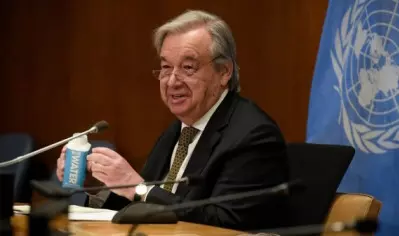
UN Chief Antonio Guterres calls for deep structural reform at G20 Summit
text_fieldsUN Chief Antonio Guterres
New Delhi: United Nations Secretary-General Antonio Guterres has emphasised the need for deep structural reform within the institution during his visit to New Delhi for the G20 Summit.
He described the world as being in a difficult transition period and called upon G20 leaders to exhibit leadership in critical areas such as climate action and the preservation of Sustainable Development Goals.
During a press briefing ahead of the summit, Guterres expressed gratitude to India for its warm welcome and hoped that India's presidency of the G20 would bring about transformative change. He commended India for representing the interests of the Global South, particularly by prioritising the development agenda within the G20.
The theme for this year's G20 summit, "One Earth, One Family, One Future," was inspired by the Maha Upanishad. Guterres commented on the theme, stating that it resonates profoundly in today's world, not only as a timeless ideal but also as an indictment of the current global state. He noted that the world, if considered a global family, appears increasingly dysfunctional, with growing divisions, tensions, and eroding trust.
Guterres stressed the importance of restructuring global institutions to reflect 21st-century realities.
He mentioned that both the global financial architecture and the United Nations Security Council require significant reform. While addressing India's potential role in the Security Council, he emphasised that such decisions rest with member states. He acknowledged India's status as a nation with the largest population and global importance within the multilateral system.
The UN Secretary-General emphasised the urgency of addressing various global challenges, including the climate crisis, conflicts, technological advancements, poverty, and inequality. He urged G20 leaders to take decisive action in two key areas: climate action and the preservation of Sustainable Development Goals.
Regarding climate action, Guterres called for more ambitious efforts to combat the climate crisis. He emphasised that the G20 nations, responsible for 80% of global emissions, must take substantial measures to limit global warming to 1.5°C above pre-industrial levels. He also proposed a Climate Solidarity Pact to engage big emitters in reducing emissions and support developing economies in this endeavour.
In terms of Sustainable Development Goals, Guterres suggested implementing an SDG Stimulus of at least $500 billion per year and transforming the business model of multilateral development banks to attract significant private finance. These measures, he believed, would accelerate SDG progress and promote investments in key areas such as energy, food systems, digitalisation, education, healthcare, job creation, and social protection.
Guterres concluded by emphasising the necessity of global collaboration to address these challenges, stating that no single nation or group, including the G20, can achieve these goals in isolation. He called for collective action to protect the Earth and secure a shared future.
On the question of India's credibility as a mediator in the Russia-Ukraine conflict, Guterres recognised the importance of all mediation efforts but expressed uncertainty about an immediate peace solution. He noted that both parties appeared committed to continuing the conflict.
The UN Secretary-General's visit to India and his remarks at the G20 Summit reflect the ongoing efforts to address global issues and promote multilateral cooperation in an ever-evolving world.























